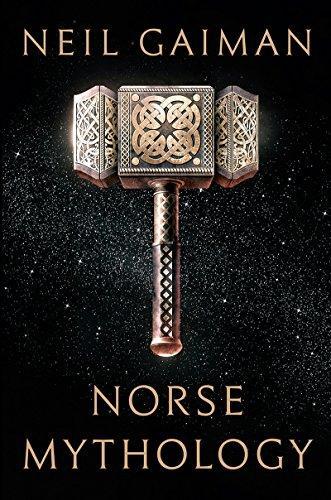Kelson Reads reseñó Norse Mythology de Neil Gaiman
Entertaining, sometimes gruesome, sometimes funny and sometimes sad
4 estrellas
collection of stories about the gods of Asgard and the elves, dwarves and giants around them, book-ended by the Norse creation myth and the world-ending battle of Ragnarok. It’s a storytelling approach, not a scholarly description. And it’s not the shiny, techno-magical Asgard of Marvel’s Thor, or the ethereal Olympus we’ve come to think of with Greek myths. For all the magic and impossible feats that get tossed around, it’s still a gritty, harsh world with wars, murders, lust, deception and betrayal.
The stories are mostly separate, but a pattern emerges: not just when stories refer back to earlier events, but the slow transformation of Loki from the kind of trickster who steals Sif’s hair, tricks rival smiths into creating fantastic gifts, and generally outwits his opponents (while finding ways to embarrass the other gods if he can) to the kind of trickster who thinks it would be hilarious …
collection of stories about the gods of Asgard and the elves, dwarves and giants around them, book-ended by the Norse creation myth and the world-ending battle of Ragnarok. It’s a storytelling approach, not a scholarly description. And it’s not the shiny, techno-magical Asgard of Marvel’s Thor, or the ethereal Olympus we’ve come to think of with Greek myths. For all the magic and impossible feats that get tossed around, it’s still a gritty, harsh world with wars, murders, lust, deception and betrayal.
The stories are mostly separate, but a pattern emerges: not just when stories refer back to earlier events, but the slow transformation of Loki from the kind of trickster who steals Sif’s hair, tricks rival smiths into creating fantastic gifts, and generally outwits his opponents (while finding ways to embarrass the other gods if he can) to the kind of trickster who thinks it would be hilarious to trick a blind man into killing his own brother.
In his introduction, Gaiman notes that we don’t actually have a thorough record of the stories. Like most myths, they were told and retold and changed through oral storytelling. The Norse didn’t write them down until well after Christianity had established itself in the region. And so there are a lot of figures who are mentioned in passing in one tale or another that we don’t really know much about.
And I realized that most of what I know of the mythology comes from modern works influenced by it. Comic books of course, not just Marvel’s Thor, but Vertigo’s Sandman and the manga and anime Ah! My Goddess. The Ring Cycle (by way of Bugs Bunny). Oddly enough, a lot of it by way of Neil Gaiman himself: Sandman, American Gods, Odd and the Frost Giants, probably a handful of short stories too.

